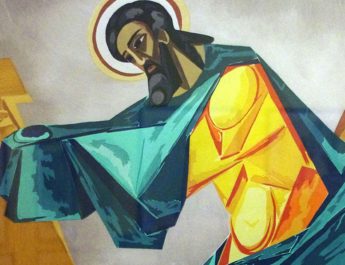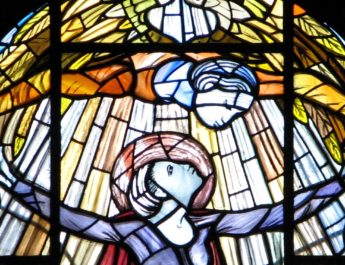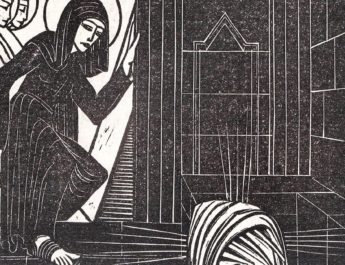Matthew 14:22-33
Ordinary A37
22 ImmediatelyA he madeB the disciplesC get into the boatD and go on aheadE to the other side, while he dismissedF the crowds.
A “immediately” = eutheos. From euthus (immediately, upright, straight and not crooked). This is directly, soon, at once.
B “made” = anagkazo. 9x in NT. From anagke (necessity – something that happens that requires an immediate response; generally associated with pain or distress.); {from ana (up, again, anew) + agcho (to press tightly, compress)} or {from ana (up, again, anew) + agkale (the arm, particularly one that is bent to carry a load); {from agkos (a bend)}}. This is to urge, compel, or force.
C “disciples” = mathetes. From matheteuo (to make a disciple of); from manthano (to learn key facts, gain knowledge from experience; generally implies reflection as part of the learning process); from math– (thinking things through). This is a disciple, learner, or student. It is where we get “mathematics” from.
D “boat” = ploion. From pleo (to sail, voyage); probably from pluno (to plunge – so to wash); from pluo (to flow). This is a boat, ship, or vessel.
E “go on ahead” = proago. From pro (before, first, in front of, earlier) + ago (lead, bring, carry, drive, guide, go). This is to lead, go before, bring forward, walk ahead. It can be before in location or in time.
F “dismissed” = apoluo. From apo (from, away from) + luo (to loose, release, untie; figuratively, to break, destroy, or annul; releasing what had been withheld). This is letting go, setting free, or releasing. So, it can be to discharge, dismiss, divorce, pardon, or set at liberty.
23 And after he had dismissed the crowds, he went up the mountain by himselfG to pray.H When evening came, he was there alone, 24 but by this time the boat, batteredI by the waves,J was farK from the land, for the windL was against them.
G “himself” = idios. This is something that belongs to you or that is personal, private, apart. It indicates a stronger sense of possession than a simple possessive pronoun. This is where “idiot” comes from (denoting someone who hasn’t had formal training or education and so they rely on their own understanding).
H “pray” = proseuchomai. From pros (advantageous for, at, toward) + euchomai (to wish, make a request, pray). This is to pray or pray for, to worship or supplicate. It is more literally exchanging one’s own wishes for God’s.
I “battered” = basanizo. 12x in NT. From basanos (touchstone used to test metals; figuratively used for interrogating using torture, torment, pain sickness); perhaps from the same as basis (step, hence foot; a pace); from baino (to walk, to go). This is to torture, interrogate by torture, torment, batter with waves, examine, strain.
J “waves” = kuma. 5x in NT. From kuo (to swell as one pregnant). This is a wave, billow, curve, or bend.
K “far” = stadion + polus. Literally “many stadia.” Stadion is 7x in NT. From the same as histemi (to stand, place, establish, appoint, stand ready, be steadfast). This is a stadium, which was a unit of length. By implication, this would refer to a racing track for a foot race. Polus is much, many, or abundant.
L “wind” = anemos. From aer (air that we breathe); from aemi (to breathe or blow). This is wind or a gust of air. It can also be used figuratively for empty doctrines.
25 And early in the morningM he came walkingN toward them on the sea.O
M “early in the morning” = tetartos + de + phulake + ho + nux. Literally “and in the fourth watch of the night.” Phulake is from phulasso (to guard something so that it doesn’t escape – to watch over it vigilantly; being on guard in a literal or figurative sense); related to phulaks (military guard, sentry, watcher). This is the act of guarding, the person who guards, the place where guarding occurs (i.e. a prison), or the times of guarding (the various watches).
N “walking” = peripateo. From peri (about, concerning, around, encompassing) + pateo (to read, trample on; to trample literally or figuratively); {from patos (trodden) OR from paio (to strike, smite, sting; a hit like a single blow)}. This is to walk. Going from Hebrew figurative language, to walk referred to how you conducted your life, how you chose to live. This word is most literally walking around. Figuratively, it is living, behaving, following, how you occupy yourself. This is where “peripatetic” comes from.
O “sea” = thalassa. Perhaps from hals (sea, salt, a boy of saltwater) or halas (salt; can be figurative for prudence). This is the sea, a lake, or seashore.
26 But when the disciples sawP him walking on the sea, they were terrified,Q saying, “It is a ghost!”R And they cried outS in fear.T
P “saw” = horao. To see, perceive, attend to, look upon, experience. Properly, to stare at and so implying clear discernment. This, by extension, would indicate attending to what was seen and learned. This is to see, often with a metaphorical sense. Can include inward spiritual seeing.
Q “terrified” = tarasso. 18x in NT. This is trouble, agitate, stir up. It is motion back and forth, creating inner turmoil or confusion, roiling water.
R “ghost” = phantasma. 2x in NT. From phantazo (to become visible or apparent); from phaino (to bring light, cause to appear, shine, become visible or clear). This is an appearance, manifestation, ghost, or spirit. It is where the word “phantasm” comes from.
S “cried out” = krazo. This is to cry out, scream, shriek. It is onomatopoeia for the sound of a raven’s call. Figuratively, this means crying out urgently without intelligible words to express something that is deeply felt.
T “fear” = phobos. From phebomai (to flee, withdraw, be put to flight). This is panic flight, fear, fear being caused, terror, alarm, that which causes fear, reverence, respect.
27 But immediately JesusU spoke to them and said, “Take heart,V it is I; do not be afraid.”W
28 PeterX answered him, “Lord,Y if it is you, commandZ me to come to you on the water.”
U “Jesus” = iesous. From Hebrew Yehoshua (Joshua, the Lord is salvation); {from YHVH (proper name of the God of Israel; the self-existent and eternal one); {from havah (to become) or from hayah (to come to pass, become, be)} + yasha (to deliver, defend, help, preserve, rescue; properly, to be open, wide or free, which implies being safe. So, in a causative sense, this is to free someone). This is Jesus or Joshua in Greek – the Lord saves or the Lord is salvation.
V “take heart” = tharseo. 7x in NT. From tharsos (courage, confidence, boldness); from thrasus (bold, daring). This is to have courage or good cheer, to be bold or confident.
W “be afraid” = phobeo. Related to “fear” in v26. From phobos (see note T above). This is also to put to flight, terrify, frighten, dread, reverence, to withdraw or avoid. It is sometimes used in a positive sense to mean the fear of the Lord, echoing Old Testament language. More commonly, it is fear of following God’s path. This is where the word phobia comes from.
X “Peter” = petros. Related to petra (large rock that is connected and or projecting like a rock, ledge, or cliff; can also be cave or stony ground). This is Peter, a stone, pebble, or boulder.
Y “Lord” = kurios. From kuros (authority, supremacy). This is a respectful address meaning master or sir. It refers to one who has control or power greater than one’s own. So, it was also applied to God and Jesus as Master or Lord.
Z “command” = keleuo. From kelomai (to urge on). This is to command, order, or direct.
29 He said, “Come.” So Peter got out of the boat, started walking on the water, and came toward Jesus.
30 But when he noticedAA the strongBB wind, he became frightened, and beginning to sink,CC he cried out, “Lord, saveDD me!”
AA “noticed” = blepo. This is literally to see – it is primarily used in the physical sense. However, figuratively it can be seeing, which includes attention and so to watchfulness, being observant, perceiving, and acting on the visual information. It can also mean beware.
BB “strong” = ischuros. From ischuo (to be strong, healthy and vigorous, able, have power, prevail; strength that engages a resisting force); from ischus (strength, might, power, force, ability; power that engages immediate resistance). This is strong – first of physical strength. Later, also used figuratively for forcible, powerful, mighty, vehement, or sure.
CC “sink” = katapontizo. 2x in NT. From kata (down, against, throughout, among) + pontos (sea; also the name of a Roman Province). This is to be submerged, drown, or sink.
DD “save” = sozo. From sos (safe, rescued, well). This is to save, heal, preserve, or rescue. Properly, this is taking someone from danger to safety. It can be delivering or protecting literally or figuratively. This is the root that “savior” and “salvation” come from in Greek.
31 Jesus immediately reached outEE his handFF and caughtGG him, saying to him, “You of little faith,HH why did you doubt?”II
EE “reached out” = ekteino. 16x in NT. From ek (from, from out of) + teino (to stretch, extend, strain). This is to stretch out, reach, lay hands on. Can also be used for casting an anchor.
FF “hand” = cheir. This is the hand in a literal sense. Figuratively, the hand is the means a person uses to accomplish things so it can also mean power, means, or instrument.
GG “caught” = epilambanomai. 19x in NT. From epi (on, upon, against, what is fitting) + lambano (active acceptance/taking of what is available or what has been offered; emphasizes the choice and action of the individual). This is to take hold of, catch, or seize. It can also mean to help. It focuses on the intentionality and resolve of the one doing the catching.
HH “of little faith” = oligopistos. 6x in NT – 5 in Matthew & 1 in Luke. From oligos (few, small, short, brief, puny) + pistis (faith, faithfulness, belief, trust, confidence; to be persuaded or come to trust); from peitho (to have confidence, urge, be persuaded, agree, assure, believe, have confidence, trust). This is of little faith – incredulous, lacking confidence.
II “doubt” = distazo. Related to “far” in v24. 2x in NT – both in Matthew. From dis (twice, doubly, again, entirely) + stasis (place, standing, rebel, position, existence); {from the base of histemi (see note K above)}. This is to waver, doubt, or hesitate. It is shifting back and forth between positions – vacillating. It is refusing to choose a position or direction.
32 When they got into the boat, the wind ceased.JJ 33 And those in the boat worshipedKK him, saying, “TrulyLL you are the Son of God.”MM
JJ “ceased” = kopazo. 3x in NT. From kopos (labor that leads to exhaustion, depletion, weariness, fatigue; working until worn out); from kopto (to cut, strike, cut off; beating the chest to lament and so to mourn). This is to tire, be stilled, stop, or cease. It can also mean to relax.
KK “worshiped” = proskuneo. From pros (advantageous for, at, to, toward, with) + kuneo (to kiss); {may be related to kuno (dog)}. This is to do reverence, kneel, to prostrate oneself in homage, to worship.
LL “truly” = alethos. 18x in NT. From alethes (true, unconcealed; true because it is in concert with fact and reality – attested. Literally, what cannot be hidden; truth stands up to test and scrutiny and is undeniable, authentic); from a (not) + lanthano (concealed, hidden, unnoticed; to shut one’s eyes to, unwittingly, unawares). This is truly, really, surely, truthfully, indeed. Properly, this is saying “in accordance with fact…” – what one is about to say can be proven and is true to reality.
MM “God” = theos. From Proto-Indo-European origins, meaning do, put, place. This is God or a god in general.
Image credit: “Christ Walking on the Water” by Julius Sergius von Klever, circa 1880.




